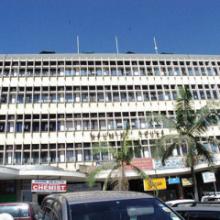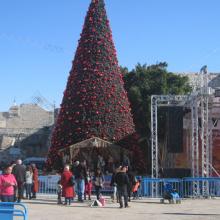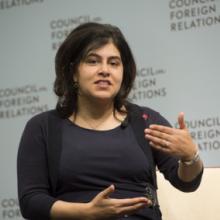Muslim

Image via Flickr / Aram Tahhan / CC BY-NC 2.0
IN JULY 2013 in Raqqa, the first city liberated from regime control in northeastern Syria, a Muslim schoolteacher named Soaad Nofal marched daily to ISIS headquarters. She carried a cardboard sign with messages challenging the behaviors of members of the Islamic State of Iraq and Syria as un-Islamic after the kidnapping of nonviolent activists. After Nofal was joined by hundreds of other protesters, a small number of activists were released. It is a small achievement, but an indication of what communities supported in responsible ways from the outside could achieve on a larger scale in areas controlled or threatened by ISIS.
In the fight against ISIS, unarmed civilians would seem to be powerless. How can collective nonviolent action stand a chance against a heavily armed, well-financed, and highly organized extremist group that engages in public beheadings, kidnappings, and forced recruitment of child soldiers and sex slaves? One whose ideology sanctions the killing of “infidels” and the creation of a caliphate?
RALEIGH, N.C. — Deah Barakat took my class “Islam in the Modern World” at N.C. State University a few years ago. He was curious about Islamic history, contemporary spiritual and political movements, and was great in class discussions. I’ve taught thousands of students in the last 11 years here, but Deah stood out for his enthusiasm, kindness, calm demeanor and obvious charisma.
Deah Barakat, Yusor Abu-Salha, and Razan Abu-Salha were the very best people. They embodied the core Islamic principle of “ihsan” — doing that which is both beautiful in itself and beautifying to the world. They volunteered to assist poor and homeless people. They planned to travel to camps in Turkey to help Syrian refugees in need. They were creative, intelligent, kind, generous. There are no words for how much we have all lost when they were gunned down and murdered in their Chapel Hill condominium last week.
Yet many insist their murders resulted from a dispute over parking. While the particular motives of the shooter cannot be determined at this stage, it is abundantly clear that these deaths were not just about parking. It is also clear the emerging discussion is about the place of Muslims in contemporary America. As we analyze the meaning of Deah, Yusor, and Razan’s murders, we are also peeling back layers of societal debates about Islam, Muslim-Americans, and the culture of intolerance and violence taking root in the U.S. On some level, it does not matter whether the shooter actually intended to kill three Muslims because they were Muslim. The public conversation is revealing several collective concerns in stark and disturbing ways.
Craig Stephen Hicks, a 46-year-old white male, has been charged with three counts of first degree murder, according to a Chapel Hill Police Release. After shooting three students in the head early Tuesday evening, Hicks turned himself in at a local police department in Pittsboro. The victims included a married couple – Deah Barakat, 23, and Yusor Mohammad, 21 – and their sister, Mohammad Abu-Salha, 19.
All three were currently attending or planning to attend schools in Chapel Hill. Although reports of previous of a conflict between the shooter and the victims are not confirmed, many have speculated religious bias played a significant role in the crime.
As France emerges from its worst terrorist attack in decades, a biting novel that imagines the country governed by Islamic law is part of a swirling debate about its basic values. Will the country respond to the shootings with fear and xenophobia, as suggested by the book “Soumission,” or “Submission” — or embrace its multicultural, multifaith identity?
On Jan. 11, solidarity was on display as heads of state and religious leaders joined millions on the streets of Paris in a massive march for free expression and to honor last week’s victims from the satirical magazine Charlie Hebdo.
Along with “I am Charlie,” some protesters also chanted “I am Jewish” in tribute to the four men gunned down by one of the assailants at a kosher market.
Muslims carried signs saying, “I am Charlie and Muslim.” And on Twitter, thousands of French rallied behind “#JeSuisAhmed” — referring to policeman Ahmed Merabet, a Muslim, who also died in the attack on the magazine.
On the edge of the dense crowd, high school student Amina Tadjouri clasped a Jewish newspaper, as she stood next to a Muslim cleric railing against radical Islam.
“I’m Muslim, and I’m not OK with these killings,” she said.
LAST YEAR, as I was unpacking my son’s school backpack, I found the children’s book on the Prophet Muhammad that my wife and I read to him at night. He had brought it to school without telling us. “It was for show and tell,” he explained to me.
You might think that my first reaction would be happiness. One of my goals as a Muslim parent is to help my kids feel connected to their faith. Clearly my son felt close enough to his religion to bring a book on the Prophet to share with his class.
What I actually felt was a shock of fear shoot down my spine. It was an immediate, visceral reaction. A whole slew of questions raced through my head. What did his teacher think of Muslims? What about his classmates? Would somebody say something ugly or bigoted about Islam during my son’s presentation? Would his first taste of Islamophobia come at the age of 5 during show-and-tell?
My fear at that moment is one small window into what it feels like to be a Muslim-American parent at a time when Muslim extremism is on prominent display and Islamophobia in America continues to spread.
The Supreme Court granted 11 new cases for review Oct. 2, agreeing to rule on controversial topics such as religious freedom, child abuse, immigration, housing discrimination, congressional redistricting and campaign fund-raising by judicial candidates.
While they delayed any decision on same-sex marriage, the justices filled out their docket through January and into February with civil rights cases and others likely to command attention.
Here’s a look at what the justices chose from among some 2,000 cases that accumulated through the summer:
It’s not every day that a coalition of legal minds is rooting for a violent inmate convicted of stabbing his girlfriend in the neck.
When Gregory Holt’s case arrives at the U.S. Supreme Court on Oct. 7, lawyers won’t be arguing about what landed him a life sentence in an Arkansas state prison, but rather what he wanted to do once he got there: grow a beard in observance of his Muslim religious beliefs.
The state of Arkansas says he can’t. Holt — a convert to Islam who now calls himself Abdul Maalik Muhammad — says he would keep his beard no longer than half an inch. But prison officials, backed by the state’s attorney general, argue that even such a short beard poses security risks.
“When it comes to making prison policies, the stakes are high; lives can be lost if the wrong decision is made,” according to the state’s legal brief, which describes Holt as a violent self-declared fundamentalist. “The ADC takes religious freedom seriously, but it takes seriously its paramount interests in safety and security, too.”
The St. Louis-based 8th U.S. Circuit Court of Appeals agreed with Ray Hobbs, the director of the Arkansas Department of Correction. But it’s hard to find too many others who think that the prison’s case for security trumps Holt’s right to exercise his religion.
More than 120 Muslim scholars from around the world joined an open letter to the “fighters and followers” of the Islamic State, denouncing them as un-Islamic by using the most Islamic of terms.
Relying heavily on the Quran, the 18-page letter released Sept. 24 picks apart the extremist ideology of the militants who have left a wake of brutal death and destruction in their bid to establish a transnational Islamic state in Iraq and Syria.
Even translated into English, the letter will still sound alien to most Americans, said Nihad Awad, executive director of the Council of American-Islamic Relations, who released it in Washington with 10 other American Muslim religious and civil rights leaders.
“The letter is written in Arabic. It is using heavy classical religious texts and classical religious scholars that ISIS has used to mobilize young people to join its forces,” said Awad, using one of the acronyms for the group. “This letter is not meant for a liberal audience.”
Even mainstream Muslims, he said, may find it difficult to understand.
FERGUSON, Mo. — Ever since Michael Brown, a young, unarmed African-American, was shot by a police officer on Aug. 9, various crews have played a part in achieving the tentative peace that has taken hold of the St. Louis suburb once rocked by protests.
Some wear black T-shirts with large white letters that spell out “Peacekeepers.” Others dress in bright orange shirts and call themselves “Clergy United.” All acknowledge that the Nation of Islam has been a key player since the very beginning.
Last week, Capt. Ronald S. Johnson of the Missouri Highway Patrol, who took over the police security patrol in Ferguson, acknowledged on national television that the Nation of Islam and other groups — such as Black Lawyers for Justice — helped control the crowds on West Florissant Avenue. Others on social media pointed out that the Nation of Islam protected businesses from looters.
The Kenya Conference of Catholic Bishops is facing a lawsuit over the cancellation of a rental contract for a restaurant operated by a Somali Muslim.
Al-Yusra Restaurant Ltd. had signed a six-year lease starting in 2013 to operate a restaurant in a section of Waumini House where the bishops’ conference is based. Baakai Maalim, a Somali Muslim, is a director for the company.
Most Christians don’t approve of President Obama right now, but he gets high ratings from Muslims and other minority religious groups.
It’s not because of their religion, though.
Obama’s level of popular approval matches Americans’ political party ties, not their religious identity, age or almost any other demographic characteristic, said Jeffrey Jones, managing editor of the Gallup poll.
The newest Gallup tracking poll shows the president’s approval rating in June averaged 43 percent for Americans overall. However, his ratings sank with Catholics to 44 percent, down from 54 percent in June 2013.
A Christian, a Muslim, and a Jew turn up together on a Washington, D.C., bus.
It’s no joke. They’re the faces of a new ad campaign by the Council on American-Islamic Relations, a Muslim civil liberties group. And the ad is the latest volley between Muslim and anti-Muslim groups that has played out most recently on the sides of buses in the nation’s capital.
First, the American Muslims for Palestine ran ads during peak D.C. tourism season, the Cherry Blossom Festival in April, condemning U.S. aid to Israel.
A month later, blogger Pamela Geller’s American Freedom Defense Initiative responded with bus ads featuring photos of Hitler meeting the grand mufti of Jerusalem and a text equating opposition to Israel’s territorial policies with Nazism.
FOR THE PAST year, life in the Central African Republic has been steadily spinning out of control.
Since the Seleka—or “alliance”—rebellion overturned the government in March 2013, there has been widespread insecurity and chaos. The U.N. Office for the Coordination of Humanitarian Affairs has called the situation a "mega-crisis."
Though the rebel movement began as a coalition of 5,000 fighters from a few rebel groups, it is now thought to have increased to 20,000, and there are credible reports that as many as 6,000 youth have been recruited into violent movements. Since December, at least 2,000 people have been killed and more than 700,000 displaced. And now there are legitimate fears of ethnic and religious “cleansing.”
To say that this conflict is about religion is a simplistic narrative. Yes, right now people are banding together with others who are like them—Christians with Christians and Muslims with Muslims. But for more than 50 years prior to the conflict, Christians and Muslims in the Central African Republic (CAR) coexisted in relative peace. From the beginning of the conflict, there were political and regional forces at work, and the Seleka forces happen to be primarily Muslim. And in retaliation for the violence and fear that came with the rebellion and the mostly untrained and loosely organized rebel fighters, fighters who happened to be Christian formed the anti-Balaka (“anti-machete”) militias. These fighters, most would agree, are not the best representatives of either faith, but they have taken over the narrative, and it is the civilians—many families and children—who suffer.
This weekend we’ll commemorate the too-short life and great work of Dr. Martin Luther King Jr. While we rightly celebrate his life dedicated to advancing equality for all, too often we overlook his call to peacemaking. This year, in light of conflicts in Syria, South Sudan, and an often-overlooked war in Central African Republic, we should remember his words.
In his 1967 speech, “Beyond Vietnam — A Time to Break Silence,” King opposed the violence, saying:
"To me the relationship of this ministry [of Jesus Christ] to the making of peace is so obvious that I sometimes marvel at those who ask me why I'm speaking against the war. Could it be that they do not know that the good news was meant for all men — for Communist and capitalist, for their children and ours, for black and for white, for revolutionary and conservative?"
Those aware of our long history at Sojourners know that we have always been committed to peace, to opposing unjust wars and finding nonviolent solutions wherever possible. And in all the work we do, we aim to speak out for the least of these, the poorest and most vulnerable.
BETHLEHEM, West Bank — Two weeks before Christmas, one of the most powerful storms to hit the Middle East in a century dumped several inches of snow on the hills of Bethlehem.
In addition to shuttering schools and businesses, the storm caused runoff to trickle down the walls of the Church of the Nativity, built above the traditional birthplace of Jesus.
Fortunately, the water damage was relatively minor, church officials say, thanks to a rare cooperative venture already underway to repair the basilica’s roof, leaky windows and old wooden beams, some 1,500 years old.
“There were still leaks, but thanks to the scaffolding that was erected for the restoration work, the damage was controlled,” said the Rev. Pierbattista Pizzaballa, custodian of the Holy Land for the Roman Catholic Church.
In what some are calling the biggest miracle in Bethlehem since the birth of Jesus, the three churches that share responsibility for the Nativity church put aside centuries of tense relations this past year to ensure the job gets done.
Two French soldiers died as a wave of deadly revenge attacks involving rival Christian and Muslim groups has left the Central African Republic in chaos.
But a Roman Catholic archbishop said the fighting pitting the two groups is not about religion, but rather politics and power.
“The religious leaders warned against this risk” of religious conflict, said Nestor Desire Nongo-Aziagbia of Bossangoa in a telephone interview. “Political leaders have not paid attention to these warnings. They wanted to antagonize the Central African Republic along religious lines in order to remain in power.”
When Marvel Comics announced the debut of its latest superhero — a 16-year-old Pakistani-American Muslim from Jersey City, N.J. — it was correctly seen as a positive development. Created and written by two American Muslim women, Kamala Khan (aka Ms. Marvel) holds promise.
But while Khan is a comic book character, she should not become a caricature.
“Her brother is extremely conservative,” the editor, Sana Amanat, told The New York Times. “Her mom is paranoid that she’s going to touch a boy and get pregnant. Her father wants her to concentrate on her studies and become a doctor.”
American literature is replete with tales of assimilation, from “My Antonia” to “The Joy Luck Club.” The overprotective mother and the demanding father are staples of the genre. But with Khan, there is an additional twist: The “conservative” brother.
The highest-ranking Muslim in the British government on Friday called on Western governments to do more to protect besieged Christian minorities across the world, particularly in the Holy Land where they are now seen as “outsiders.”
Baroness Sayeeda Warsi, the government’s minister for faith and the first Muslim member of a British cabinet, said religious freedom is a proxy for human rights and must not be an “add-on” to foreign policy.
“A mass exodus is taking place, on a biblical scale,” she said in a speech at Georgetown University. “In some places, there is a real danger that Christianity will become extinct.”















